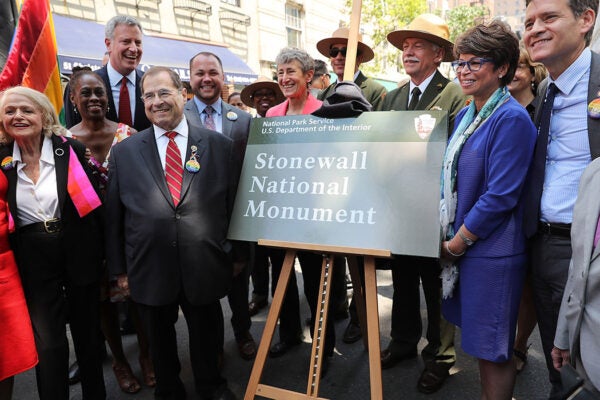Stonewall National Monument Declaration: Annotated
In June 2016, President Obama proclaimed the first LGBTQ+ national monument in the United States at the site of the 1969 Stonewall Uprising in New York City.
The Fugitive Slave Act of 1850: Annotated
The Fugitive Slave Act erased the most basic of constitutional rights for enslaved people and incentivized US Commissioners to support kidnappers.
The Alien Enemies Act: Annotated
Confused about the oft-mentioned Alien Enemies Act? This explainer, with links to free peer-reviewed scholarship, may help clear things up.
Joseph McCarthy in Wheeling, West Virginia: Annotated
Senator Joseph McCarthy built his reputation on fear-mongering, smear campaigns, and falsehoods about government employees and their associates.
“Lynch Law in America”: Annotated
Ida B. Wells-Barnett, whose January 1900 essay exposed the racist reasons given by mobs for their crimes, argued that lynch law was an American shame.
The Power of the Purse
The first time a president withheld funds for something approved by Congress, it led to the Impoundment Control Act. We’ll soon find out if that law has teeth.
Citizens United v. Federal Election Commission: Annotated
The 2010 decision, enabling the rise of super PACS, made possible new and more covert mechanisms for funding election campaigns in the United States.
Annotations: A Christmas Carol by Charles Dickens
Scrooge became as good a friend, as good a master, and as good a man, as the good old city knew, or any other good old city, town, or borough, in the good old world.
The Treaty of Paris 1783: Annotated
The Treaty of Paris marked the end of the Revolutionary War and the hostilities between Great Britain and the newly independent United States—at least temporarily.
Andrew Jackson’s Speech on the Indian Removal Act: Annotated
In December 1830, two months after the passage of the Indian Removal Act, President Andrew Jackson used his annual Congressional message to celebrate the policy.
The Federalist No. 1: Annotated
Alexander Hamilton’s anonymous essay challenged the voting citizens of New York to hold fast to the truth when deciding to ratify (or not) the US Constitution.
Webster’s Dictionary 1828: Annotated
Noah Webster’s American Dictionary of the English Language declared Americans free from the tyranny of British institutions and their vocabularies.
Missouri Compromise of 1820: Annotated
The “compromise” attempted to answer the question of whether the Missouri territory would be admitted to the Union as a “slave” or “free” state.
“Heed Their Rising Voices”: Annotated
In 1960, an ad placed in the New York Times to defend Dr. Martin Luther King, Jr. and other civil rights activists touched off a landmark libel suit.
The Fourteenth Amendment: Annotated
Adopted in 1868, the Fourteenth Amendment to the US Constitution addresses citizenship rights, due process, and equal protection under the law.
Ulysses Obscenity Decision: Annotated
In December 1933, Judge John Woolsey issued what would become one of the best known legal decisions on obscenity in United States history.
“Tell Me about a Complicated Man”: A Homer Reading List
The amount of scholarship on Homer and his works can be daunting. We've created this introductory reading list to help guide your explorations.
“A Time To Speak”: Annotated
On September 15, 1963, a bomb killed four Black children in Birmingham, Alabama. Who threw that bomb? Each of us, argued Birmingham lawyer Charles Morgan, Jr.
“Now We Can Begin”: Annotated
To mark the 1920 ratification of the Nineteenth Amendment to the US Constitution, activist Crystal Eastman described the path to full freedom for American women.
“What to the Slave is The Fourth of July?”: Annotated
On July 5, 1852, Frederick Douglass gave a Fourth of July speech that became his most famous public oration.
Declaration of Conscience: Annotated
In June 1950, Senator Margaret Chase Smith criticized Joseph McCarthy's anticommunist campaigns. She was the first of his colleagues to challenge his Red Scare rhetoric.
90 Years On: The Destruction of the Institute of Sexual Science
In May 1933, Nazi-led student groups organized public burnings of "un-German" books, including those held in the library of the Institute for Sexual Science.
Brown v. Board of Education: Annotated
The 1954 Supreme Court decision, based on the Fourteenth Amendment to the US Constitution, declared that “separate but equal” has no place in education.
The Paris Agreement: Annotated
Adopted by almost 200 parties at the 2015 UN Climate Change Conference, the Paris Agreement captures international ambitions for cooperative climate action.
“Zombie” Anthony Comstock Walks Among US (Again)
Or, how a moribund act of legislation continues to shape the fight for reproductive rights in the United States.

























